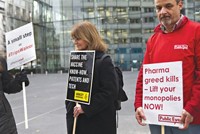Advertisement
Grab your lab coat. Let's get started
Welcome!
Welcome!
Create an account below to get 6 C&EN articles per month, receive newsletters and more - all free.
It seems this is your first time logging in online. Please enter the following information to continue.
As an ACS member you automatically get access to this site. All we need is few more details to create your reading experience.
Not you? Sign in with a different account.
Not you? Sign in with a different account.
ERROR 1
ERROR 1
ERROR 2
ERROR 2
ERROR 2
ERROR 2
ERROR 2
Password and Confirm password must match.
If you have an ACS member number, please enter it here so we can link this account to your membership. (optional)
ERROR 2
ACS values your privacy. By submitting your information, you are gaining access to C&EN and subscribing to our weekly newsletter. We use the information you provide to make your reading experience better, and we will never sell your data to third party members.
Comment
A strong and stable IP system incentivizes tools to combat COVID-19
by Carlyn Burton, chair, ACS Committee on Patents and Related Matters
October 21, 2021
| A version of this story appeared in
Volume 99, Issue 39

The American Chemical Society Committee on Patents and Related Matters (CPRM) provides information and guidance to ACS and the broader chemistry community about patent and other intellectual property (IP) issues. During the pandemic, the world witnessed the power of science and innovation, including the creation of mRNA vaccines. The rapid deployment of these technologies was made possible by years of innovations incentivized by IP systems worldwide. This system has always played a vital role in incentivizing the discovery, development, and commercialization of novel scientific technologies that benefit not only those rewarded with IP rights but also the public.
However, some have argued that our IP system is a hindrance and has contributed to the worldwide vaccine shortage, particularly in developing countries. At an October 2020 World Trade Organization (WTO) meeting, India and South Africa proposed waiving certain IP protections provided by the WTO Agreement on Trade-Related Aspects of Intellectual Property Rights (TRIPS Agreement). In May 2021, the Biden administration announced support for the TRIPS IP waiver proposal. The proposed waiver provides no specifics but states that obligations from certain sections of the TRIPS Agreement related to copyrights, designs, trade secrets, and patents shall be waived in relation to health products and technologies for the prevention and treatment of COVID-19.
Because the proposed TRIPS waiver encompasses multiple forms of IP, including trade secrets, it is appropriately described as an IP waiver. However, mainstream media and social media have often incorrectly characterized the TRIPS proposal as a patent waiver. Such calls for patent waivers in the mainstream channels suggest that but for the existence of patents, the world would have greater access to vaccines. Given that a patent provides its owner only the right to exclude others from making, using, or selling their invention, a patent waiver would simply prevent an owner from enforcing their patents against competing COVID-19 vaccine producers. Patent rights alone are not the sole issue or even the primary barrier to greater vaccine distribution, and mainstream media’s portrayal of patents being the primary barrier is due to a conflation of patents and IP as if they are one and the same.
Proponents of the TRIPS IP waiver argue that IP protections stand in the way of increasing the manufacture of lifesaving vaccines in areas of the world where such vaccines are scarce, and that there is inadequate voluntary licensing by the IP right holders surrounding the vaccine technology to manufacture sufficient doses of vaccines. Opponents counter this claim, arguing that waiving companies’ IP rights will do little, if anything, to increase the supply of vaccines given the manufacturing complexities and supply chain (including cross-border) issues that are also hurdles to vaccine production. The chemical community can appreciate these hurdles, including the lack of sufficient manufacturing facilities, particularly for vaccine production.
At our recent meeting, CPRM reviewed these issues in detail. It is not clear from the proposal what the waiver of trade secret protections entails and whether it would involve a forced technology transfer (particularly of trade secrets and other know-how), which would likely be critical to achieve swift and successful vaccine manufacture. However, because disclosure is antithetical to the existence of trade secret, if trade secret disclosure is forced, the IP is likely lost. In contrast, an IP right holder who voluntarily licenses their technology with terms of confidentiality receives contractual assurances that their rights are maintained.
Interestingly, TRIPS and many national IP systems already provide mechanisms for granting compulsory licenses, such as in a national emergency, but compulsory licenses generally only relate to licensing of patents without a forced technology transfer. In fact, compulsory licenses have been granted in some jurisdictions during the pandemic for production of the antiviral remdesivir. TRIPS also allows for the exportation of treatments to countries without sufficient manufacturing capacities.
Unfortunately, the breadth of the IP waiver and the inclusion of the waiver of trade secret protections in the proposal indicate that trade secret information and other know-how are likely needed to manufacture at least some of the COVID-19 vaccines (particularly mRNA vaccines). Such information would not be made available under most compulsory licensing schemes. However, supporters of the IP system fear that the waiver of trade secret protections and forced technology transfer would have a long-term destabilizing and stifling effect on future innovations if our IP system does not provide reliable protections to innovators.
While the moral calls for increasing vaccine production for this pandemic are strong, immediate trade-related steps—such as addressing supply chain concerns and investing in infrastructure to increase manufacturing capacity—would facilitate increased voluntary licensing without dismantling our international IP system. CPRM and ACS have long supported a strong IP system that helps ensure continued innovations needed to combat this as well as the next crisis.
Views expressed are those of the author and not necessarily those of C&EN or ACS.




Join the conversation
Contact the reporter
Submit a Letter to the Editor for publication
Engage with us on Twitter